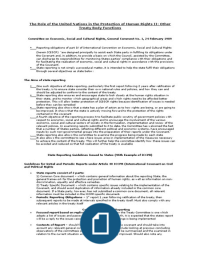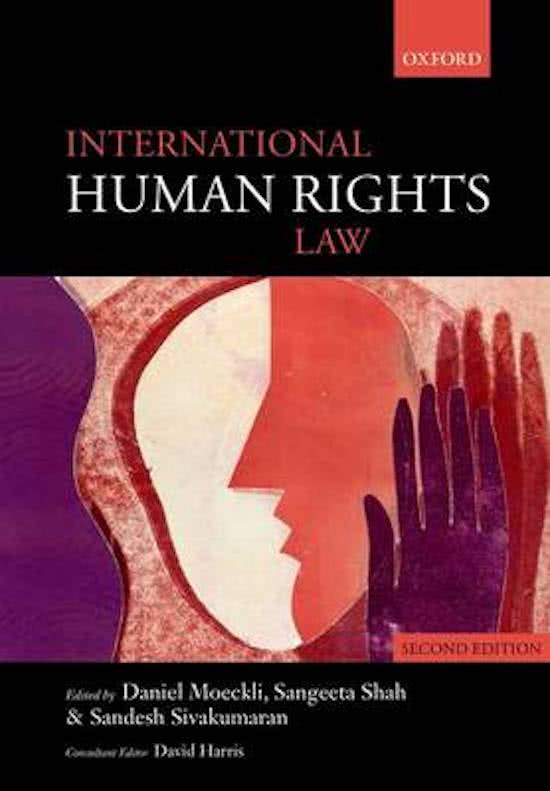The Role of the United Nations in the Protection of Human Rights II: Other
Treaty Body Functions
Committee on Economic, Social and Cultural Rights, General Comment No. 1, 24 February 1989
Reporting obligations of part IV of International Convention on Economic, Social and Cultural Rights
(herein ICESCR) ‘are designed principally to assist each State party in fulfilling its obligations under
the Covenant and, in addition, to provide a basis on which the Council, assisted by the Committee,
can discharge its responsibilities for monitoring States parties' compliance with their obligations and
for facilitating the realization of economic, social and cultural rights in accordance with the provisions
of the Covenant’.
State reporting is not simply a procedural matter, it is intended to help the state fulfil their obligations
through several objectives as state below:
The Aims of state reporting
One such objective of state reporting, particularly the first report following 2 years after ratification of
the treaty, is to ensure state consider their own national rules and policies, and how they can and
should be adjusted to conform to the content of the treaty.
State reporting also ensures and encourages state to look closely at the human rights situation in
their state, and to monitor which geographical areas and which rights need to be afforded better
protection. This will allow better protection of ICESCR rights because identification of issues is needed
before they can be remedied
State reporting also shows that a state has a plan of action as to how rights are being, or are going to
be improved. It shows that the state is actively moving forward to the protection of the rights
contained in the covenant
A fourth objective of the reporting process it to facilitate public scrutiny of government policies with
respect to economic, social and cultural rights and to encourage the involvement of the various
economic, social and cultural sectors of society in the formulation, implementation and review of the
relevant policies. In examining reports submitted to it to date, the Committee has welcomed the fact
that a number of States parties, reflecting different political and economic systems, have encouraged
inputs by such non-governmental groups into the preparation of their reports under the Covenant.’
State reporting also allows the committee to examine the progress being made by each state
It also allows the committee to see where issues arise in implementation of the measures necessary
to achieve the content of the treaty. This will further help the committee identify how these issues can
be avoided and reduced so that full realisation of the treaty is available
State Reporting Guidelines Issued to States (With Example of ICCPR)
Guidelines for Initial and Periodic Reports under Article 40 ICCPR (International Covenant on Civil
and Political Rights
State reports consist of 2 parts:
1) Common Core document – which contains general information about the reporting State, the
general framework for the protection and promotion of human rights, as well as information on non-
discrimination, equality and effective remedies.
2) Treaty Specific Document – which contains specific issues relating to the implementation of the
Covenant, and should avoid duplication of information already included in the common core
document. If a State party, however, has not submitted a common core document, all relevant
information must be included in the ICCPR-specific document.
Periodic Reporting Obligations – 1st report 1 year following ratification of the treaty, then
subsequent reports to be made at intervals specified in the treaty itself. Must also comply with any
relevant articles in the treaty itself
General Guidance for Reporting
Focused report based on replies to list of issues – When the Treaty Committee is one which
adopts a list of issues and passes it on for the state to deal with, it is expected that the states report
will be a reply to the issues raised. They should state how change is being implemented
Contents of Report – should follow the relevant articles in the covenant and should take into
account any relevant general comments. For the ICCPR this include looking at previous concluding
observations of the committees previous report, which should be summarised and the examined in
relation to the current situation and how the matter is being improved. Should also note any





